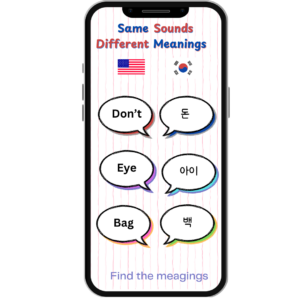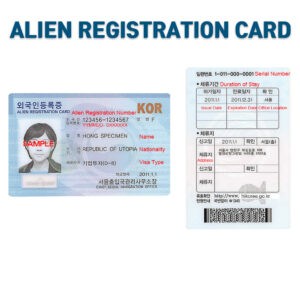Languages can surprise us in delightful ways. Sometimes, words in two completely different languages sound exactly the same but carry entirely unrelated meanings. If you speak both Korean and English, you might find yourself smiling at these amusing coincidences.
Let’s explore ten fun examples where Korean and English words sound alike but mean completely different things!
1. “Don’t” (English: Not to Do)
In English, “don’t” means do not.
In Korean, “돈” (pronounced don) means money.
- English: “Don’t waste your time!”
- Korean: “돈이 필요해요.” (I need money.)
It’s funny how an English word about stopping something turns into a Korean word about wealth!
2. “Eye” (English: The Organ of Sight)
In English, “eye” refers to what you see with.
In Korean, “아이” (pronounced ai) means child.
- English: “My eye hurts.”
- Korean: “아이를 돌봐주세요.” (Please take care of the child.)
Eyes and children couldn’t be more different, yet here they are, sharing the same sound!
3. “Sin” (English: Wrongdoing)
In English, “sin” is an act of moral wrongdoing.
In Korean, “신” (pronounced sin) means god/spirit or shoe.
- English: “Telling lies is a sin.”
- Korean (god): “신에게 기도하세요.” (Pray to God.)
- Korean (shoe): “신이 너무 작아요.” (The shoes are too small.)
This single sound moves from the divine to something as simple as footwear!
4. “Noon” (English: Midday)
In English, “noon” refers to 12 o’clock midday.
In Korean, “눈” (pronounced nun) means snow or eye.
- English: “Let’s meet at noon.”
- Korean: “눈이 많이 왔어요.” (It snowed a lot.)
Here, noon shifts from a time of day to the beauty of snowfall or even your eyes!
5. “Bag” (English: Something to Carry Things)
In English, “bag” refers to something used to carry items.
In Korean, “백” (pronounced baek) means 100.
- English: “I bought a new bag.”
- Korean: “백 명이 참석했어요.” (100 people attended.)
A simple word about luggage in English becomes a number in Korean!
6. “Meal” (English: Food You Eat)
In English, “meal” refers to an occasion where you eat food.
In Korean, “밀” (pronounced mil) means wheat.
- English: “Breakfast is the most important meal of the day.”
- Korean: “밀가루를 사용했어요.” (I used wheat flour.)
While English focuses on food you eat, Korean refers to the grain itself.
7. “One” (English: The Number 1)
In English, “one” is the number 1.
In Korean, “원” (pronounced won) means Korean currency or a circle.
- English: “I have one book.”
- Korean: “천 원이 있어요.” (I have 1,000 won.)
Here, one represents a number in English but money or a shape in Korean!
8. “In” (English: Inside or Within)
In English, “in” refers to being inside something.
In Korean, “인” (pronounced in) means person but usually appears in compound words like 인구 (population) or 인명 (a person’s name or life).
- English: “The keys are in the bag.”
- Korean: “인구가 많아요.” (The population is large.)
While in describes position in English, 인 in Korean relates to people when combined with other words.
9. “네” (Korean: Yes) and “Nay” (English: No)
This is one of the funniest contrasts!
In Korean, “네” (pronounced ne) means yes.
In English, “nay” (pronounced nei) is an old-fashioned way of saying no.
- English: “Nay, I disagree with that decision.”
- Korean: “네, 알겠습니다.” (Yes, I understand.)
The same sound gives completely opposite meanings—affirmation in Korean and rejection in English!
10. “Bean” (English: Edible Seed)
In English, “bean” refers to food, such as coffee beans or green beans.
In Korean, “빈” (pronounced bin) is an adjective meaning empty.
- English: “I love coffee beans.”
- Korean: “이 방은 빈 방이에요.” (This is an empty room.)
The Korean word 빈 comes from the root adjective 비다 (to be empty). It’s used to describe spaces like rooms (빈 방), seats (빈 자리), or containers (빈 병 meaning empty bottle).
Why These Overlaps Are Fun to Notice
These sound-alike words remind us how wonderfully quirky languages can be. Whether you’re studying Korean, a native speaker, or just love languages, discovering these little overlaps adds an extra layer of fun and curiosity to learning.
Have you found other similar words that sound the same but mean something different? Share them below—we’d love to hear about more hidden twins between Korean and English!








